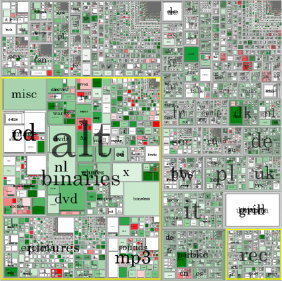A couple weeks ago AT&T Internet services decided to globally eliminate all binary newsgroups from their newsserver. This was done with absolutely no advance warning (or any after-the-fact announcement either 1), and was ostensibly an effort to eliminate child pornography. How that excuse justifies blocking access to audio files takes a stretch of imagination, but word on the street points to yet another successful campaign by the entertainment industry to control product revenue (euphemistically called intellectual property rights)2.
I was even more surprised by the lack of public outcry: hardly anyone really noticed. I presume that’s because Usenet, perhaps the oldest surviving social networking system, is largely unknown to the modern cadre of myspace drones (yeah, imagine a forum without any advertising, I admit it seems weird). One ISP anecdotally revealed that when they shut down their newsserver last year they received a total of two complaints. How can the First Amendment survive against corporate and government control if nobody cares, or even notices?
In an age of exponentially blossoming information, the probability of finding true innovation and creativity in Borders or Target becomes negligible. It seems obvious to me that the limited choices offered by large retailers catering to mass market demographics, coupled with the manipulation of popular taste by media conglomerates, can only serve to increasingly dumb down our cultural narrative. For those of us who enjoy exploring the path less traveled, with its potential for discovering new vistas of aesthetic inspiration, the loss of easy access to forums such as Usenet is disastrous3. For those savvy artists who realize that music files are not so much products as advertisements that can attract fans, the loss is doubly catastrophic: they lose both their audience and their voice.
There’s a fascinating article about the Usenet at the Journal of Computer-Mediated Communication, with some intriguing treemaps depicting the explosion of binary newsgroups, in addition to other revealing interpretations of social networking dynamics. For example, they state that “most striking…is the growth in the proportional size of the alt.binaries hierarchy as compared to other areas of alt and the rest of Usenet in general. From this point of view the more social activities of Usenet—discussion, support, and technical help—are being overtaken by file exchange.” Of course, that was before AT&T had anything to say about it. Citizens freely sharing information? The very idea!
- It was comical to observe how tech-support complaints were met with such practiced dumb innocence ↩
- Gee, it must be just a coincidence that this move to further eliminate individual freedoms coincided with the New York State parallel move to begin taxing internet sales. Retailers are fighting this in court. ↩
- Granted, one can pay one of the many usenet providers, but that’s the point: as content explodes, access becomes limited and increasingly commercial. The web, like the airwaves, used to be free. ↩
